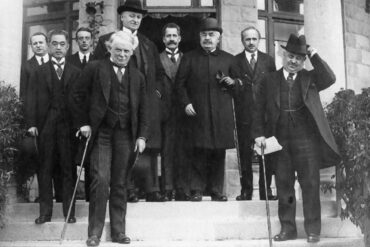“This is your mother speaking…”
That would be the strong, clear, very proper, yet playful voice on the other end of the line, calling from the States. Trained in opera, my mother lived her life and expressed herself in what can only be described as full range. Deftly avoiding delving too far into taboo subject matter such as religion, politics and sex, she was nevertheless intensely opinionated – albeit in a highly respectful sort of way.
“Respect” being the keyword here.
We kids were raised with such stuff as “respect people for who they are and not for what you want them to be” and “remember, everyone has a reason for acting the way they do.” But once a perceived redline or border had been crossed, Mom abruptly switched gears into, “I will not tolerate this in my house!” And we heard that a lot.
So, while our home was often an open house with a varied, colorful and talented array of personalities, opinions, and faiths parading through, we did not have an “open” house. I like to think of it as somewhere between Avraham’s tent being open on all sides and God siding with Sara on drawing the line. There were no mixed messages. But nuance, discernment and wisdom ruled the roost.
My parents had mastered the art of navigating the galut as proud Jews, making the occasional wave when necessary, but rarely disturbing the elephant in the room – especially when it came to sensitive issues of faith.
Few Diaspora Jews would feel comfortable expressing the core reason as to why they do not and cannot believe in Jesus… ever. Historically speaking it would be a slap in the face to whichever Christian nation was hosting or offering refuge to them at the time. Plus, one risked getting pages torn out of traditional liturgy… or worse. And so, while in exile, the absolute Oneness of God and prohibitions regarding forbidden worship remained safely engraved upon our hearts, souls and minds – but we dared not wear it on our sleeves.
When the modern State of Israel embarked on a faith-based partnership with devout christ-centered evangelicals, we imported the formula of building the relationship on, and embracing perceived theological commonalities rather than asserting our peoplehood and placing an emphasis on respect for glaring differences. This easy-out approach conveniently allowed us to bypass any fundamental and unnerving disparities, and unfortunately paved the way for the intractable situation we now find ourselves in – the evangelization of Israel, masquerading as “religious freedom.”
Experts at self-deprecating humor, rabbis and activists (mostly olim from Western countries) led the interfaith charge by regularly reciting this quip to evangelicals: “When the messiah comes, we will ask is this your first or second time?”
With a lot of camaraderie, bereft of rebuke, honesty or the reprimand of “I will not tolerate this in my house,” Christian missionaries became convinced that the only reason for Jews to stubbornly refuse to believe in Jesus was due to a horrific history of church anti-Semitism. And so, in order to make amends, profuse apologies were preached from the pulpit followed by an outpouring of kindness and magnanimous generosity towards Israel (much of it in the name of Jesus – or the Hebraicized name “Yeshua”).
But it was a little disingenuous for Jewish leadership to egg the evangelicals on while basking in the glory of this “unconditional love” affair and friendship evangelism. Because now it’s the rabbis and public officials in Israel who are apologizing left and right for every perceived slight to Christendom.
With Christian nationalism and Dominionism on the rise and a new cross-denominational globalized missionary church showing its bare-face to Jerusalem, while declaring what can only be described as a decade-long evangelism crusade, Israel would do well to listen to some age-old advice on nations, friends and allies:
“Nations don’t have friends; they have interests.”
Just ask Henry Kissinger, and before him Charles De Gaulle. And before him Lord Palmerston. I heard this concept at a lecture given at Matan, in connection with Avraham’s dealings with Avimelekh. So, when the teacher proceeded to cite a Talmudic-era Mishna, I had a “eureka moment”:
“…R’ Yossi ben Hanina’s view, for he said: Love unaccompanied by rebuke is not love. Reish Lakish said: Rebuke leads to peace; hence, ‘And Abrahman reproved Avimelekh’. Such is his view, for he said: Peace unaccompanied by rebuke is not peace.” – B’reishit Rabbah 54:3
This took me back to the interfaith directives of Rav J.B Soloveitchik, z”l, who – respectful to a fault – was nevertheless unafraid of “confrontation” with the church.
For the sake of peace, Jewish sovereignty and continuity, Israeli chutzpah may have to pull rank over tolerance. The elephant in the room has clearly run out of room, and before we all get crushed, I’m gonna set free those Jews suffering in the oppressive shackles of Western-style religious freedoms and who have not felt at liberty to express their truth.
Let the rebuking begin, but I’m not sure who to start with…the Jews, the evangelicals, the Orthodox churches, or the mixed multitudes of messianics and Judeo-Christian sects in Israel all vying for legitimacy?
Spit or Spat?
The inability and reluctance to express ourselves on taboo topics such as forbidden worship has left a lot of Jews tongue-tied, so much so that what should be a legitimate spat on how to handle aggressive missionary campaigns has been intentionally misconstrued and reduced to an unrelated issue of spit by the local, international, and Christian media.
Apparently there had been a number of incidents over a period of many years of some young Jews spitting on the ground outside of churches or when passing Orthodox Christian clergy in Jerusalem. There is an old tradition among some Jews to spit on the floor – even of their own Synagogues – when referencing idol worship in liturgy, with some Synagogues at one time designed with built-in spittoons. In addition, spitting when passing churches or crosses, was seen as a symbolic act of defiance taken by persecuted and powerless Jews in parts of Christian Europe. Why this tradition still exists in certain Israeli circles is beyond the scope of this article. However…
In response to complaints by Christian clergy, Jerusalem Chief Rabbi Shlomo Amar stepped up to the plate and penned a strongly worded letter, dated the 25th of Iyar ( May 16th), denouncing such behavior. But a funny thing happened on the road to good intentions and Rav Amar got unjustly clobbered by his own bat. Twelve days later, certain Israeli officials, Christian leaders and the media commandeered his letter and used it to condemn a protest against missionaries who were launching a 10-year campaign to evangelize every person on earth and doing some pretty abominable things on the southern steps of the Temple Mount, which were televised worldwide.
Things like calling children under 15 to missionize Israeli children in the schools. Or the graphic spectacle of a Hebraicized-Judeo-Christianized Catholic-style communion (the kind where adherents partake of a wafer and wine representing the body and blood of their lord and savior).
The leaders at that event were all but salivating over the prospects of Armageddon and the predicted “drama and trauma” and carnage in its wake. Messianic leadership told the crowd that there are 20,000-30,000 Jewish believers in Jesus in Israel today, with many in the Torah community who are secret believers. Not surprisingly, a few weeks later, the Israeli media was reporting the figures of “messianic Jews” in Israel at 30,000-40,000. The enthusiastic participation of long-time “Christian Zionist” friends and leaders, such as ICEJ’s president Juergen Buehler and former United States congresswoman Michelle Bachmann, left a particularly bad taste in the mouths of those Jews who saw and heard.
I imagine both Jews and Muslims (who are also in evangelical sights) felt like saying, “Get a room people!”
One would have expected the Israeli government and Jerusalem municipal representatives to assert themselves and declare, “Take it to the church and off the steps of the Temple Mount, because, we will not tolerate this in our House!”
But instead, Knesset lawmakers and Israeli public officials began to sputter apologies for offending the prayers of proselytizing pilgrims who strive to erase the Jewish faith.
A barrage of media accusations ranging from religious freedoms and human rights violations to violence and church persecution were directed at those demonstrating and it got nasty on
Facebook when the venerated Christian red heifer rancher posted a photo of himself and his wife on their way to a meeting with Knesset leaders, while referring to the counter-missionary protesters as “radical antichrist Jews.”
Trampling the Chief Rabbi of Jerusalem in the name of Jesus
Journalist Atara Beck of World Israel News began taking note of the staggering number of Israeli, international, Christian and messianic-missionary news and social media reports which had misappropriated Rav Shlomo Amar’s letter by stating that it had been written as a condemnation of those protesting the missionary event. Nobody seemed to pay attention to the date on the letter. She contacted Rav Amar’s office.
Her article is well worth a read, but the take-away from Rav Amar’s office is as follows:
“The letter by the Rishon LeZion and Chief Rabbi of Jerusalem, Rabbi Shlomo Amar, was written on the 25th day of Iyar 2023 (16.5.23), and this was due to complaints from clerics representing different religions about harassment and acts [against them] that would not be done by truly God-fearing people.
“There is no connection between the letter by the Rishon LeZion and any event noted by missionaries, whose purpose is to, God-forbid, bring innocent people to their religion,”
“Certainly, any attempt to present the letter of the Rishon LeZion as support for those missionaries is nothing but complete deception bordering on crime.”
Once Beck’s article appeared in World Israel News and The Jewish Press, the publication Israel365 issued an immediate and thorough retraction and apology: CORRECTION: Chief Rabbi did not defend Christian missionaries
But that didn’t stop Jerusalem Deputy Mayor Fleur Hassan from perpetuating the myth. Nor did it stop soon-to-be Cardinal, Latin Patriarch of Jerusalem, Pierbattista Pizzaballa from continuing to use the letter in connection to the protest claiming, in a feature in al-Monitor, that it was he who played a major role in getting the letter released in reaction to “an unauthorized violent protest on May 28 by religious Jews against Christian worshipers at the Western Wall.”
Then came German Abbot Nikodemus Schnabel to further politicize developments. In a video that has now gone viral and is still creating headlines, Schnabel was asked by staff at the Western Wall to cover the cross he was wearing. Schnable made a point of saying, “It is painful to see how the climate in this wonderful city is changing more and more for the worse under the new government.”
But Schnabel, who was appointed to his current position by none other than Pierbattista Pizzaballa, has been in Jerusalem since 2003 and he knows that the cross-at the Kotel (Western Wall) controversy happens every few years, for many years and under all persuasions of Israeli governments – including an incident in 2007 that took place under a liberal pro-Western coalition led by Ehud Olmert and Tzipi Livni. But kadima, let’s move on, to 2016 when Cardinal Marx and Bishop Bedford-Strohm “…the two most prominent representatives of German Christendom – Catholic and Protestant alike – caused a considerable debate by hiding their own distinctively Christian symbol and Sacred Sign – the Pectoral Cross – while they were both visiting the Jewish Wailing Wall as well as the Muslim Dome of the Rock on the Temple Mount.”
In response, Petra Heldt, a female Protestant pastor and representative of the association “Ecumenical Fraternity” in Jerusalem, did not mince words: “When you come to the [Temple] Mount in Luther’s garment or in an episcopal garment, you have to keep your Cross. Otherwise, when rebuked for it, you just leave.”
She went on to say that “here in the East of many religious wars, Christians would rather die than deny the Cross.”
Of course, we know that Pastor Heldt knows that countless Jews have died and would still die rather than accept the cross.
We all know that, but nobody wants to say it in Israel, lest it ruffle interreligious feathers. But at this time in Israel’s history, it needs to be said, heard and understood. Otherwise, any cooperative endeavor between Jews and evangelical Christians becomes an insincere, impossible and potentially grievous faith-based fail.
Beyond respect for Jewish sensitivities, there is also the matter of sanctity of holy sites and I imagine there are halakhic considerations too, which are again beyond the scope of this piece.
Religious Freedom as Tyranny
Sanctity appears to be a non-starter in Sweden. The almost Torah burning in Sweden, in the name of freedom of expression, was averted thanks to a public outcry and wide media coverage. But the episode exposed a fundamental difference between Jewish leaders in Israel and those beholden to the American government in the Diaspora.
Statements coming from Israeli rabbis and top government officials alike put an emphasis on desecration of “sacred texts” and “sacred Jewish objects” and “the eternal Book of the Jewish people” and “the holy of holies of the Jewish people.”
The response coming from US Ambassador Deborah Lipstadt, Special Envoy to Monitor and Combat Anti-Semitism, was to be expected for someone in her position: “While the United States supports freedom of expression and the right to peaceful assembly as elements of democracy as well as supporting the right to freedom of religion or belief for all, such acts will create an environment of fear.” But if Ambassador Lipstadt was unshackled from her US government position, would she have felt free to express herself as a Jew reacting to a threatened Torah burning?
Rabbi Abraham Cooper, chairman of the US Commission on International Religious Freedom (USCIRF), has recently been critical of India for their increasing religious nationalism. His comments condemning India’s anti-conversion laws and other violations were recently televised in a Christian Broadcasting Network (CBN) report.
If Israel, once again, tried to legislate counter-missionary measures, would Rabbi Cooper condemn the Jewish state for religious freedoms violations?
Or, as a Jew in his position, would he dare to say that “Israel has a right to formulate its own definition of religious freedom. There is no reason for the Jewish state to import those definitions from Christian nations which value proselytizing as a theological principle. Israel was created to ensure Jewish continuity.”
Is religious freedom the new idol worship? Are there no red lines left and is nothing sacred? In an age of absolute tolerance, will it be forbidden for Jews to say “no” in our own land? Will Diaspora Jewish leaders consider a devastating scenario and the possibility that they may be contributing to a situation where religious freedom, a la America, becomes oppressive tyranny for Jewish Israelis?
As the race towards “end times” accelerates, I respectfully suggest that we Jews, the Christians and all the wannabe shades in between take a time out and go back to the future.
In August of 1972, my family had the privilege of sitting with David Ben Gurion in his home in Sde Boker.
I was 13 at the time and a little awestruck. He asked me why I didn’t know Hebrew and when I was making aliya to Israel. Never quite got the Hebrew, but I did make aliya exactly 14 years later.
There was one other couple in the room at the time and the conversation went something like this: “We are gentiles and very impressed with your land, your people and all that has been accomplished here. Is there some appropriate way that we, as gentiles, can assist the Jewish state?”
At that point we had stepped away because it was their conversation. But I do remember my mother saying to us kids: “Did you see how that refined and respectful gentile couple conducted themselves?”
I heard and I saw. It was comforting and felt right because both Jew and gentile knew who they were and where they were standing. And without that understanding of respect for – and acceptance of – separateness, there can be no reconciliation between our communities.






on the mark
..totally.Thank you